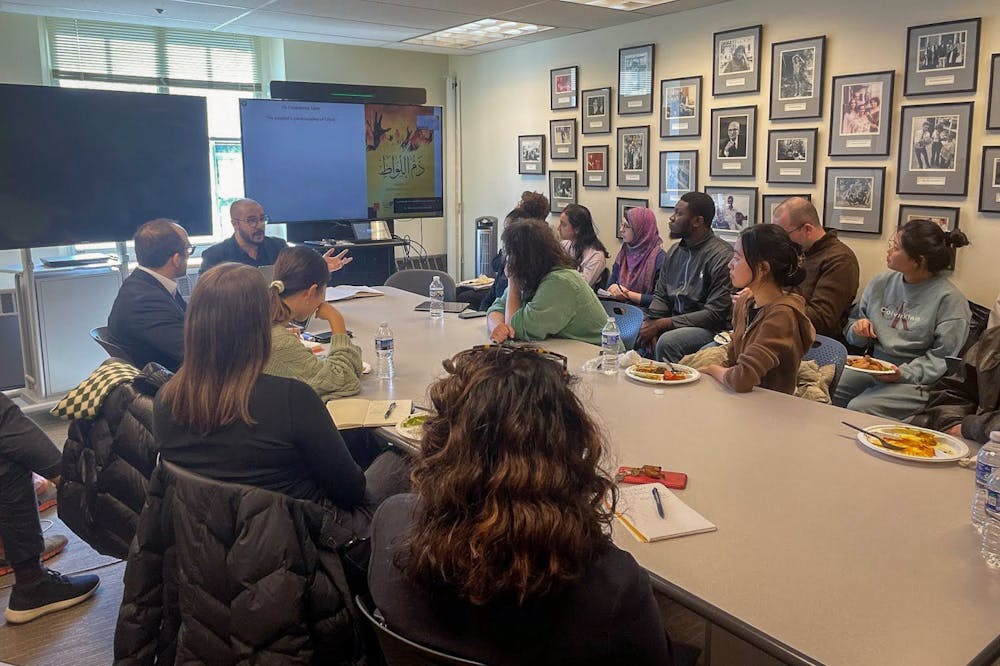Continuing a series of seminars in the Islamic studies colloquium, the University's Program in Islamic Studies hosted an event titled "Sex, Gender, and Islam," co-sponsored by the Women and Gender Studies department, on Monday, Feb 19. The event featured Ahmed Ragab, an associate professor at the School of Medicine.
Ragab is a historian, physician and documentary filmmaker whose research focuses on the history of medicine in the pre-modern Middle East and the Islamic world. His talk was grounded in Sunni orthodox literature and the queer history of Islam. Ragab began with his research on classical sources for religious opinions on gender and sexual ethics and then connected them to contemporary narratives.
In an interview with The News-Letter, Ryan Calder, event organizer and director of the undergraduate program in Islamic Studies, explained the purpose of the event.
"We wanted to bring more awareness to the Islamic Studies Program and hope the attendees engage with our faculty and learn more about their work,” he said. “Such events are geared towards undergraduates who might be interested in taking on a minor in Islamic Studies."
Ragab began the talk with an examination of the two anchor points around which political narratives on gender and sexual ethics are centered. He cited the first anchor point as the Quran story of Lut's People: Lut was a prophet sent to people who failed to heed God's message. The narrative details how Lut's house was surrounded by the people, demanding he surrender his guests, who were angels in disguise. The angels revealed themselves to Lut, instructed him to leave with his family and warned him that the town would be destroyed.
According to Ragab, many exegetes agree that the people of Lut had a preference for sex between men. However, there is a consensus that such characteristics were not the direct cause of the punishment of these people; instead, the reason was that they did not heed the message of God.
The discussion then transitioned to an analysis of particular texts around this narrative by Hadith reporters. Ragab described these narrations and the problems in them.
"Exegetical narrations lump the deeds of the people of Lut along with various other things, many of which are considered at the time as almost mundane," he noted. "The list in this tradition makes it quite weak in proving an attorney's point.”
Ragab explained that the weaknesses of many traditions make them impossible to apply as a basis for legal verdicts.
The second anchor point revolved around two groups: intersex people — those whose genitals, chromosomes or reproductive organs do not fit into a male/female sex binary — and men who dress and act like women. Ragab presented perspectives by several scholars and the associated nuances.
"There is a differentiation between people who are dressing and behaving in this way as part of their nature, which is permissible, and those who do it out of pretensions or fashion, in which case it is prohibited," he said.
Junior Madeleine Grabarczyk, a Classics major and Islamic Studies minor, reflected on the topic of gender and sexuality in Islamic texts.
"I found it interesting that we often think of gender and sexuality as being understood in the binary from a historical perspective, while there are historical records showing that how we conceptualize these ideas [was] quite dynamic over the centuries," she said in an interview with The News-Letter.
To connect with contemporary narratives, Ragab presented various websites offering legal opinions that mention the two anchor points discussed. He also highlighted the distinction between different online spaces issued by legal entities and others that are less credible.
Ragab concluded the talk by presenting a view of the historical context of gender nonconformity and queerness in Islamic societies.
"I argue that while sex and gender did not exist in that same differentiation in Islamic text, there is a clear understanding of the difference," he stated. “The collapse of the two terms can be traced back only to writings of Islamic Law in the 19th century following contemporary trends."
Many undergraduate attendees commented that they could relate some aspects of the discussion to their personal interests.
"I thought the idea of epistemic religious decline concerning gender and sexuality was interesting and often reflected in my studies," Grabarczyk said.
In an interview with The News-Letter, Renee Wu, a junior double majoring in International Studies and Sociology with a minor in Islamic Studies, talked about what she took away from the seminar.
“I study a lot about the relationship between Islam and democracy, as well as Islamism and post-Islamism,” she said. “Today’s lecture certainly strengthened my understanding of a pluralistic form of Islam in its early days and helped me understand how the jurists draw supportive statements from different Islamic texts.”





